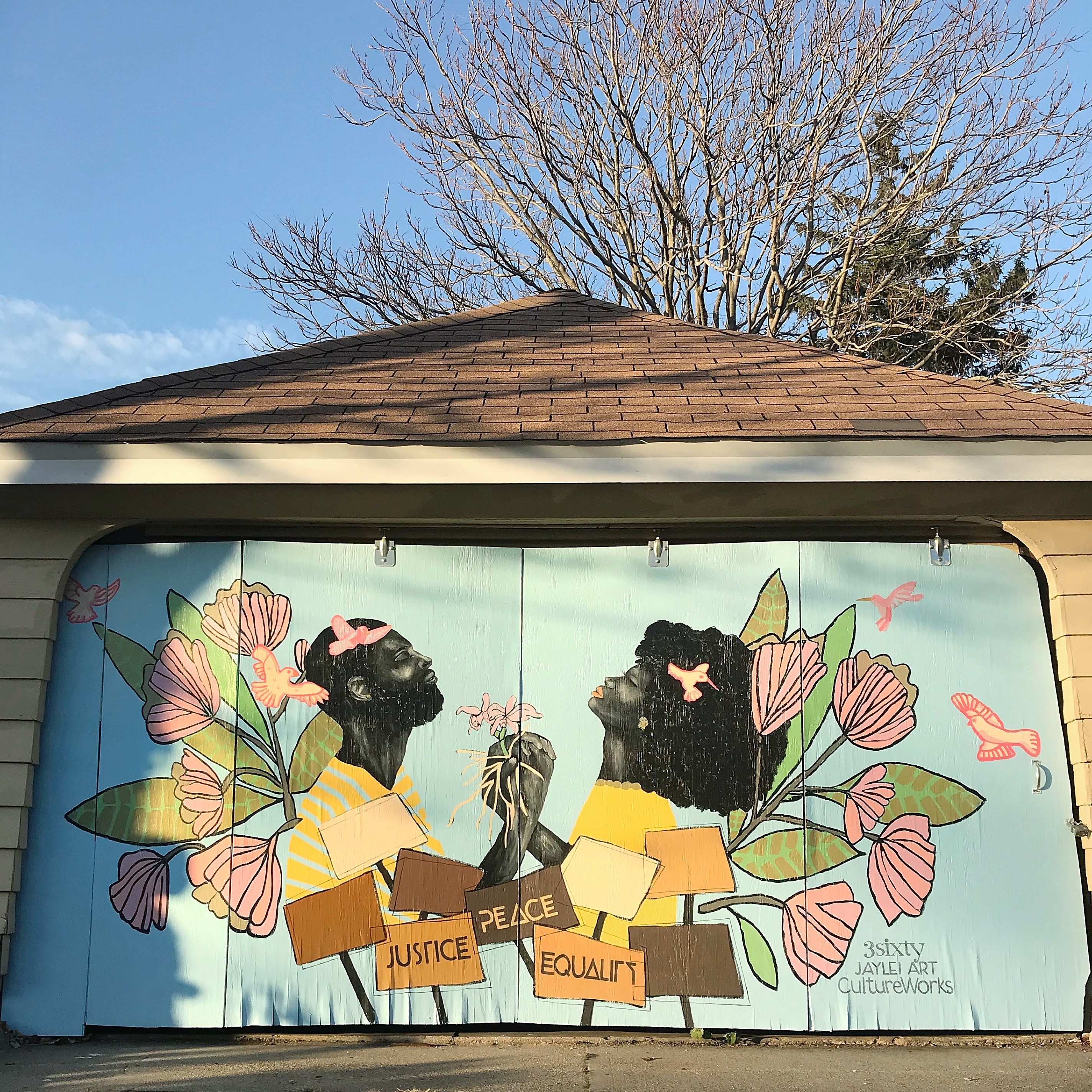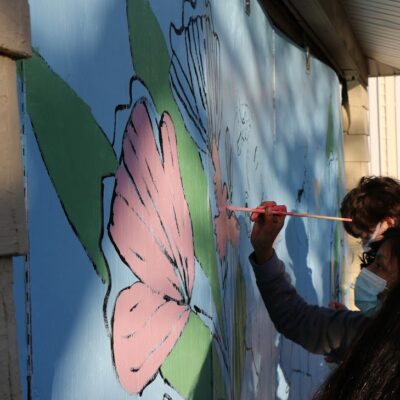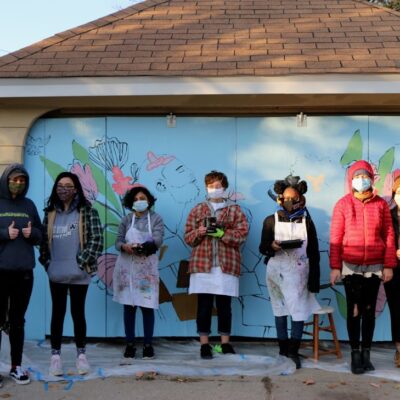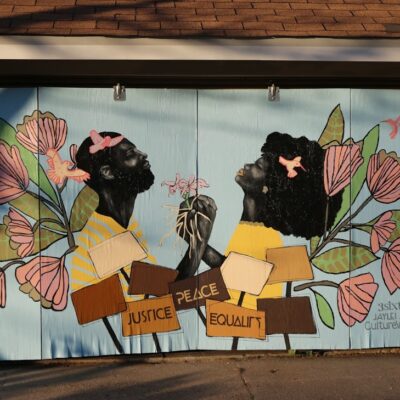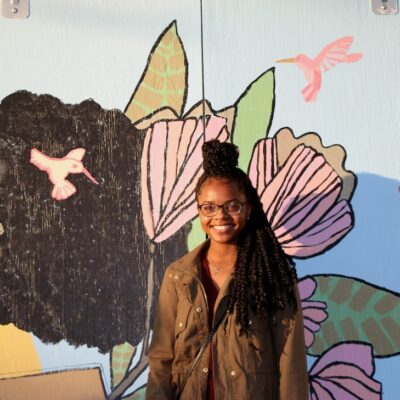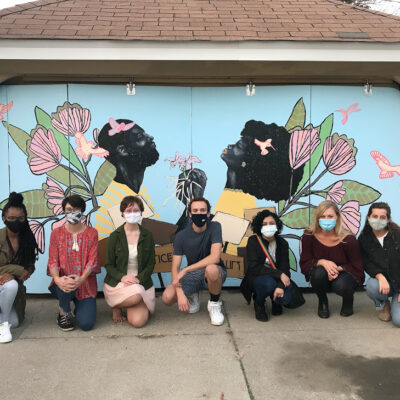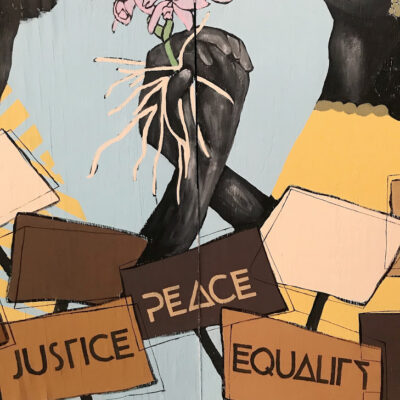CultureWorks’ Student Advisory Council partnered with 3Sixty and Jamari Taylor of Jaylei Art to create a mural to communicate themes of unity, justice, hope, equality, and diversity.
During the sleepless week of the presidential election, we were given the beautiful opportunity to paint a mural in partnership with 3Sixty, Jamari Taylor of Jaylei Art, and our Student Advisory Council. This mural began as a dream among 3Sixty’s Community Connector, Maddie Roberts, and CultureWorks Instructor, Sammie Mikolitis, during the genesis of a budding community partnership in May. The Kuja family of the Eastcore neighborhood offered their garage door as a mural space with the desire for area students to express how they feel about our current socio-political situation, especially in regard to racial violence and injustice in our nation. Our CW Student Advisory Council students envisioned, designed, and painted this mural as a response to that reality. When we were just beginning to imagine the possibilities of this mural, students were asked to brainstorm words they hoped the mural would convey. We all agreed that we wanted this project to communicate unity, justice, hope, equality, diversity, community and so much more: words that carried us through the entire creative process.
As I reflect on the weeks leading up to the completion of the mural, I consider the world around us: a global pandemic that has ripped opened afresh long-existing structures of injustice and inequity; a contentious election season that has left us all weary at the acknowledgement of division and hatred in our nation; a year filled with isolation, confusion, natural disasters and fear, not to mention the disregard for black and brown bodies in our country from microaggression to murder, and everything in between.
I was on edge, trying to properly absorb all of the emotional secondhand smoke I was carrying from multiple directions while also tending to my own hopes, fears, laments, and celebrations. Frankly, I often pendulum swing between hope that we can heal the world and fear that we never will. So, I lean on the One who can and does heal.
My favorite word for the Holy Spirit is the greek “Parakletos,” meaning helper or advocate, and in some instances it quite literally means “the one who comes alongside.” This year has made me so tired. Yet it is not lost on me that if in my privilege, sustained employment, and good health I am tired, I know there are those far more tired than I. So I’ve often considered what it might mean to reflect the spirit of Parakletos…what it might look like to “come alongside.” For me, and for us at CultureWorks, the answer usually comes down to the creative act. As we painted during a few different days that long, election week, the weather was perfect. The sun served as a sign of mercy that shone upon our ability and opportunity to “come alongside” in this small but significant way.
Murals throughout the majority of Art History were reserved for religious spaces, as subjects comprised royalty and divinity and viewing was reserved for people associated with those spaces. In the last century, artists like Diego Rivera (and later civil rights artists) propelled new visual narratives. Everyday people who had not been readily regarded with importance became subjects of murals, and murals became available to the masses á la public spaces. Yet because of this preceding history, we can deduce that to place a subject in a mural is to command reverence; it’s holy in a way, much like how the subjects of old were viewed.
It’s no secret that black and brown lives in America have been too readily cast aside, excluded, and downright violated. We’ve seen it. We still see it. From birds of freedom, to the purple orchids that symbolize respect, to the words chosen, each section of this work aims to elevate the two Black subjects to a place of importance, as students thought carefully about what it would look like to cultivate a moral vision in which these lives mattered. This type of Shalom begins with acknowledging that that which has not mattered enough now must, and such acknowledgment demands reverence.




